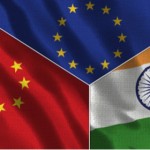The world is experiencing a fundamental transition in the global balance of power. In the West, the common values that have long formed the basis of the transatlantic alliance are eroding – a development that is going hand in hand with loosening security ties. But while economic interests are shifting towards the high-growth Eastern economies, the West appears fixated on China.
To be sure, the West’s perspective on China is changing: the U.S. has identified Beijing as a strategic competitor and revisionist power, and even the famously cautious European Union has characterised China as a “systemic rival”. Simultaneously, Germany and other European countries continue nurturing strategic partnerships with China. During her 14 years in office, Chancellor Merkel has visited China 12 times, compared to three visits to India.
Europe may not be able to sustain this ambiguity much longer. The time has come to play a constructive role in the emerging new order, and in the Indo-Pacific region, in particular. EU member states, which combined, still form the largest economy in the world at $19 trillion, will have to make hard choices — between principles and pragmatism, democracy and commerce, between India and China.
From an Indian point of view, relations with Germany and Europe have been positive, but not frictionless: since the end of the Second World War, large parts of Europe have practically outsourced their security to the North Atlantic Treaty Organisation (NATO). Germany alone hosts approximately 30,000 American troops. Yet, having taken shelter under the U.S. nuclear umbrella, the EU imposed sanctions on India for undertaking its own nuclear tests, driven, in no small part, by China’s growing nuclear arsenal, a perpetually hostile Pakistan, and their military nexus.
India and Germany do share a deep interest in multilateralism and globalisation. That is why India has worked with Germany for 14 years for an expansion of the UN Security Council. But can Delhi trust Berlin? Does Germany really want to reform the Security Council when, as part of the Organisation for Economic Cooperation and Development (OECD) and the G7, it is already being treated as a de facto member? Is Berlin genuinely prepared to challenge the permanent seats held by France and the UK, two countries that are no longer global powers and are being surpassed economically by India?
Along with the P-5, the EU and Germany played key roles in negotiating the Joint Comprehensive Plan of Action (JCPOA) with Iran. After President Trump repudiated the agreement, Europe tried to encourage Iran to uphold its part of the deal. Its lackadaisical efforts were overtaken by events that unfolded in the form of the attacks on Saudi oilfields.
The ensuing U.S. sanctions continue to negatively affect India’s oil trade with Iran and weapon purchases from Russia. Singed by the extra-territoriality of American sanctions and the resulting adverse effects on European corporations, the EU should increase its efforts to challenge the mistaken idea that the efficacy of sanctions will positively influence Iran’s – or any other country’s – behaviour.
On trade, Germany, as the strongest economy in the EU, should support the granting of better access to the Single Market for developing countries, including India. Instead, a potential EU-India FTA has been held up for 12years by the Europeans’ pressure on India to reduce its import tariffs on wine and cars. Germany’s disinterest in the asymmetry of current trade arrangements was encapsulated recently by Berlin’s ambassador to India, who was quoted by the Indian media as saying: “We want to sell more cars here, and if you want to sell more saris in Germany, then go ahead.”
As the Trump administration is undermining the World Trade Organization, Europe and India should be working together to regulate trade – but to do so, Indians would want to see Europe trying to salvage not only the WTO itself, but also, and more importantly from an India point of view, its principles.
In the changed global configuration, developing countries are becoming ever more conscious of their markets’ attractiveness. Germany, Europe, and the West should be aware that those who are inclined to use their new-found power coercively are not the only game in town. While differences in perceptions will remain, liberal Europe and a democratic India have much to contribute to an equitable, dynamic world order. Every decision taken or choice not made by Europe can nudge the world in a certain direction, be it towards democracy or autocracy.
Neelam Deo is Co-Founder and Director, Gateway House.
This article first appeared in The Berlin Pulse 2019-20.


